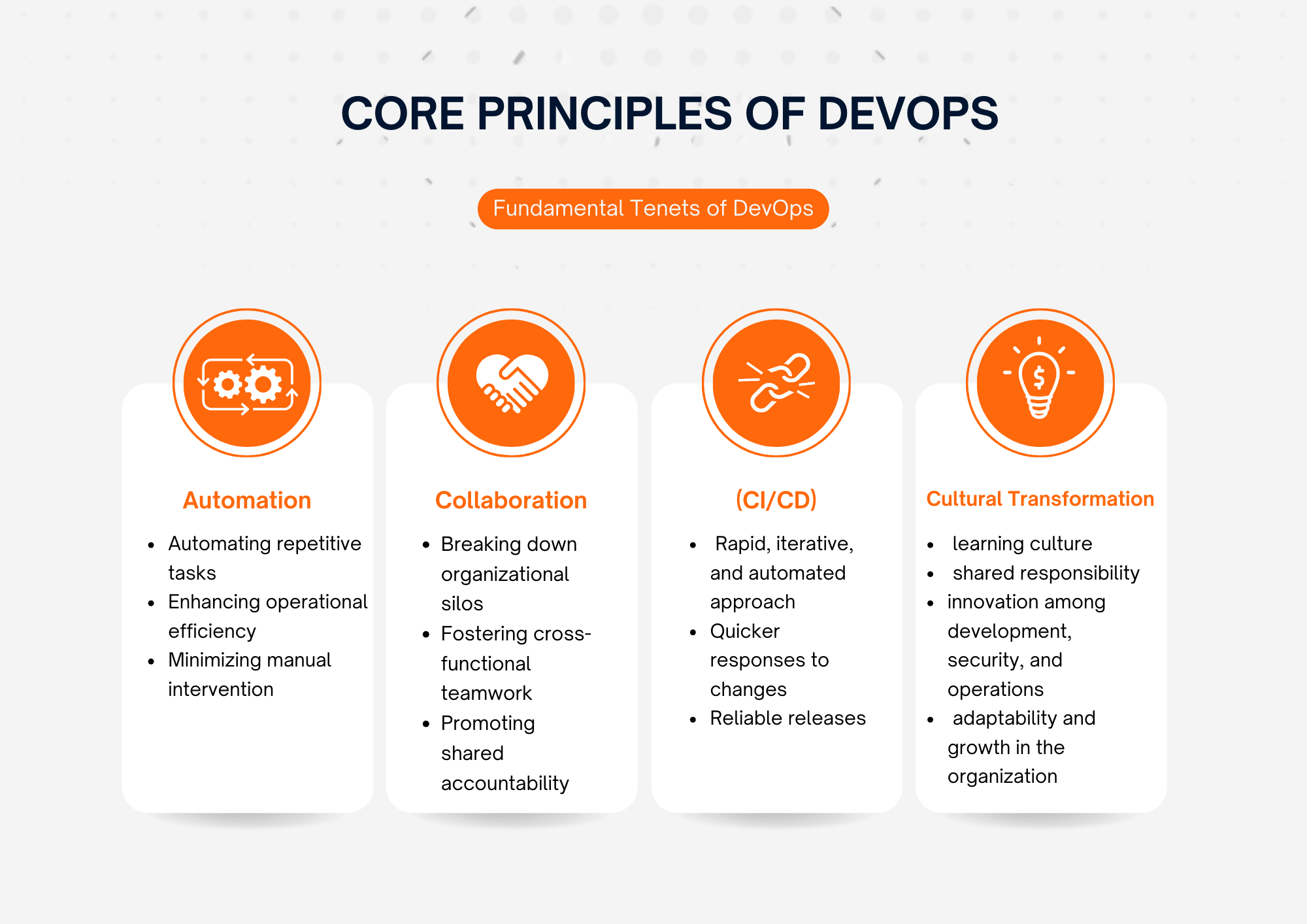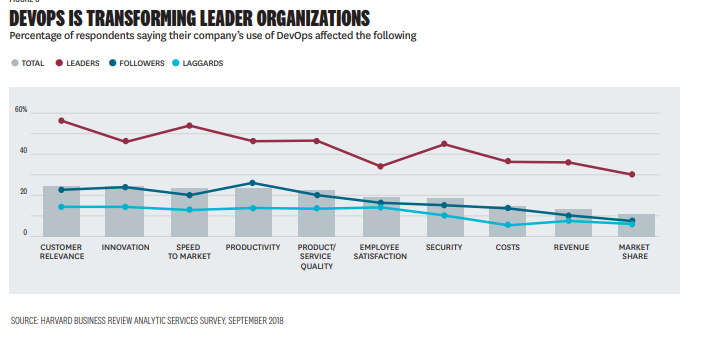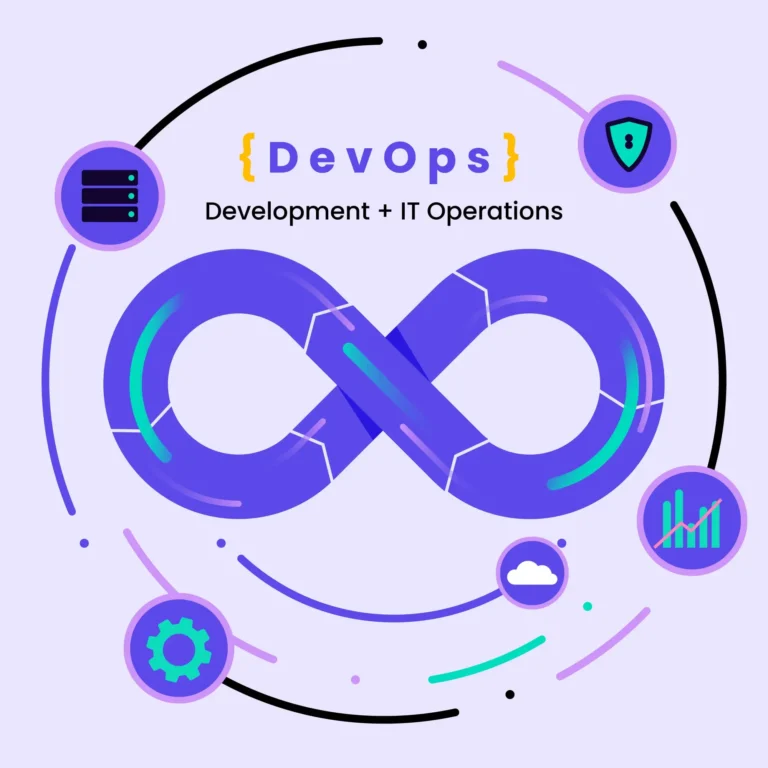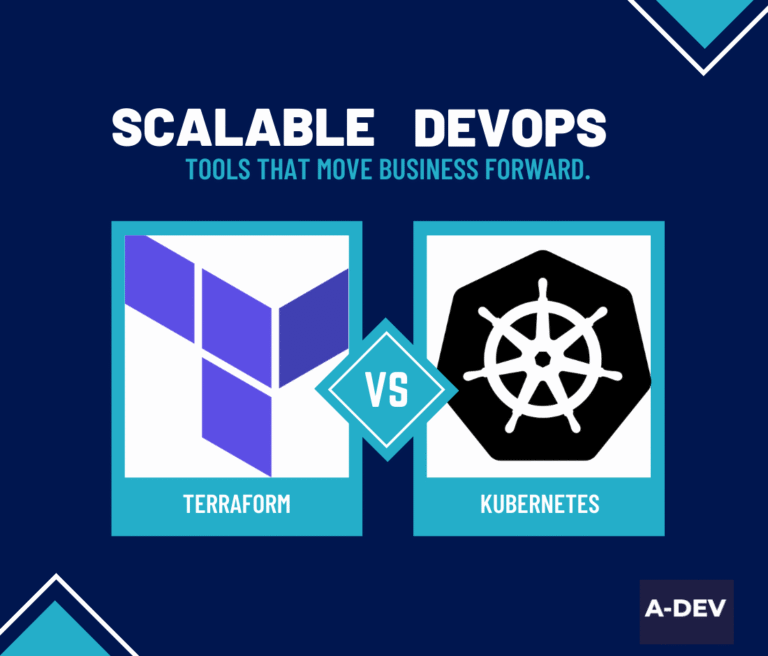In the dynamic landscape of modern software creation, DevOps has emerged as a revolutionary force reshaping traditional methodologies. Adopting DevOps represents more than just a mere methodology; it embodies a transformative journey that transcends boundaries between development and operations. This article endeavors to unravel the essence of implementing DevOps strategy, unveiling its core principles, transformative impacts, and the compelling motivations steering organizations towards this innovative approach.
What is DevOps adoption?
In our exploration of DevOps and its transformative impacts, it’s imperative to delve into the foundational principles that drive this paradigm shift. The article “Understanding DevOps Fundamentals and Essential Principles” comprehensively articulates the core ideologies propelling DevOps practices. This resource underscores the significance of interaction, automation, and permanent integration, echoing our assertion that DevOps embodies a cultural transformation rather than a mere methodology.
Core Principles of DevOps

DevOps encapsulates a set of core ideologies that revolutionize conventional software developing approaches:
- Automation: Streamlining development and operations workflows by automating repetitive tasks, enhancing operational efficiency, and minimizing manual intervention.
- Collaboration: Breaking down organizational silos, fostering cross-functional teamwork, and promoting shared accountability.
- Continuous Integration/Delivery (CI/CD): Implementing a rapid, iterative, and automated approach to software delivery, enabling quicker responses to changes and ensuring reliable releases.
- Cultural Transformation: Cultivating an environment of learning, shared responsibility, and innovation among development, security and operations teams, fostering adaptability and growth.
Transformative Impact of DevOps Adoption
The transformative impact of DevOps adoption echoes the insights from “Understanding DevOps Fundamentals and Essential Principles,” reshaping conventional practices and fostering an environment that nurtures innovation and continuous improvement:
- Enhanced Efficiency: Streamlined processes leading to accelerated development cycles and quick adaptations to evolving requirements.
- Improved Quality: Implementation of continuous testing and integration practices resulting in higher-quality software releases.
- Increased Collaboration: Teams working cohesively, sharing ownership and accountability, fostering innovation, and enhancing overall productivity.
- Agile Deployment: Automated deployment practices ensuring swift, error-free software releases and promoting seamless operations.
DevOps philosophy signifies a transformative paradigm shift that integrates key principles, fostering a culture propelling organizations toward enhanced efficiency, quality, and collaboration. This transformative approach redefines conventional practices, emphasizing collaboration, automation, and continuous integration.
Why are companies adopting DevOps?
In today’s realm of Software as a Service (SaaS) solutions, the intricate nature of applications necessitates the adoption of DevOps methodologies across diverse industries. As online applications grow in complexity, enriched with features and robust security measures, their multi-layered structure and numerous dependencies significantly influence operational efficiency.
Triggers for Embracing DevOps Practices
Scaling Operations: The need to manage a vast number of concurrent software instances for an expanding user base becomes imperative.
Continuous Updates: Requiring immediate software updates and bug fixes to ensure codebase stability and address security issues and concerns drives the adoption of DevOps practices.
Uninterrupted Access: The essentiality of maintaining 24/7 availability, even during software updates, across multiple time zones becomes a critical factor.
DevOps Strategies to Address Challenges
DevOps engineers employ diverse strategies to address heightened demands in software creation:
- Decomposing Codebases: Transforming extensive codebases into manageable microservices facilitates scalability and maintenance.
- Efficient Deployment: Streamlining deployment processes enables quick and error-free software releases.
- Optimizing Infrastructure: Enhancing scalability and reliability by optimizing infrastructure performance.
- Aligning Development Processes: Coordinating development and maintenance procedures for seamless integration.
- Task Automation: Automating routine tasks reduces manual intervention, fostering productivity.
Benefits & Challenges Encountered in DevOps Adoption
Successful implementation of DevOps practices yields a spectrum of benefits and navigates through a series of challenges, crucial in shaping the trajectory of organizations adopting this transformative methodology.

Benefits:
- Accelerated Feature Delivery: DevOps expedites feature delivery by streamlining deployment processes, allowing developers more time for coding.
- Enhanced Quality Assurance: Test automation reduces time-to-market and ensures software stability with fewer bugs upon release.
- Optimized Costs: Through infrastructure optimization and task automation, DevOps significantly reduces development and maintenance expenses.
- Continuous Availability: DevOps ensures minimal downtime, providing uninterrupted service through robust monitoring and recovery plans.
Challenges:
- Cultural Alignment: Aligning organizational culture with collaborative DevOps practices can be a challenging shift.
- Hiring Skilled Professionals: Recruiting proficient DevOps experts who fit the organizational culture remains a challenge.
Real-World Success Stories
Netflix’s groundbreaking success in entertainment hinges on its adept use of DevOps practices, notably highlighted in Hiren Dhaduk’s article on Simform’s blog. Through continuous delivery and automated testing, as detailed in the piece, Netflix seamlessly introduces new features while upholding a stable streaming platform, underlining the company’s commitment to innovation and technological excellence.

Amazon has revolutionized its infrastructure management through DevOps principles. As detailed in the article “DevOps Case Study: Amazon AWS” by C. Aaron Cois, this initiative drastically cut deployment times and boosted scalability and reliability across services. For an in-depth analysis, refer to the article.

Etsy: The article “Case study: What the enterprise can learn from Etsy’s DevOps strategy” delves into Etsy’s successful implementation of DevOps principles. Etsy’s adoption of DevOps allowed it to transition from disruptive site updates to deploying code updates every 20 minutes, minimizing operational disruptions and enabling quicker feature releases. Jon Cowie, an operations engineer at Etsy, emphasizes the importance of a collaborative culture and demonstrates how aligning DevOps with business objectives can benefit enterprises.

At its core, DevOps aims to create a unified environment, aligning development, testing, and operations with shared objectives. This convergence expedites delivery while enhancing quality and stability, aligning perfectly with the needs of modern landscapes through the utilization of DevOps tools.
Source: Adapted from iTechCraft Blog – Why Should Your Business Adopt DevOps?.
What percentage of companies are adopting DevOps?
Amidst the ever-evolving landscape of software creation and IT operations, understanding the prevalence of DevOps adoption among organizations unveils pivotal insights into its significance and transformative impact.
Prevalence of DevOps Adoption
Statistical insights illuminate the rates of adopting DevOps practices and industry trends shaping the DevOps landscape:
- Current Adoption: A substantial 80% of organizations are actively practicing DevOps, signifying a widespread acknowledgment of its value and impact (Puppet).
- Market Growth: Predictions indicate a staggering growth trajectory, with the global DevOps market anticipated to surpass $24.71 billion by 2027, reflecting a compound annual growth rate (CAGR) of 22.9% (Research and Markets, 2022).
- Elite Performers: Approximately 50% of DevOps adopters are classified as elite or high performers, showcasing a remarkable 30% improved efficiency, denoting the evolving maturity and effectiveness of DevOps practices (Nagarro).
Industry Trends and Surveys
- Harvard Business Review: Insights reveal that 86% of organizations recognize the pivotal importance of DevOps in their operations, showcasing its increasing significance (Harvard Business Review).

- RedGate Survey: An impressive 74% of organizations have already embraced DevOps mindset in some form, a substantial rise driven, in part, by the transformative impact of the pandemic (RedGate).
- Puppet Survey: Notably, over 80% of organizations are currently practicing DevOps, with an anticipated increase to a staggering 94% in the near future, underlining its inevitable proliferation across industries (Puppet).
- Logz Report: While many organizations have adopted DevOps mindset, approximately 15% are in the planning stages, indicating an ongoing shift in methodology, and 9% have yet to initiate adoption, highlighting potential growth opportunities (Logz).

Future Projections
- Credence Research and Future Outlook: Projections indicate an exponential growth trajectory for DevOps, estimating its market value to exceed $35 billion by 2030, driven by the burgeoning demand for services and tools supporting its implementation (Credence Research).

The statistics and industry trends underscore a significant and upward trajectory in DevOps adoption. The increasing recognition of DevOps’ pivotal role in enhancing operational efficiency and software developing practices reaffirms its position as a transformative methodology reshaping the future of IT and software engineering.
DevOps Implementation and Adoption Strategy
In the pursuit of successful DevOps adoption, organizations traverse a transformative path, necessitating a thoughtful blend of methodologies, cultural shifts, and technological integration. Synthesizing insights from our in-depth exploration of DevOps adoption, aligned with the top DevOps best practices presented in ‘Top DevOps Best Practices for Streamlining Operations’, we unveil pivotal strategies crucial in reshaping organizational approaches. Let’s navigate through these best practices, shedding light on their influence in optimizing operational efficiency and nurturing innovation within the DevOps framework.
Embracing Cultural Transformation: Fostering Collaboration and Continuous Improvement
At the core of DevOps adoption lies the transformative shift in organizational culture, transcending mere processes and tools. This metamorphosis emphasizes the creation of a collaborative ecosystem where shared responsibility and continual learning thrive.
Cultivating Shared Ownership and Collaboration
DevOps teams catalyze an environment where cross-functional teams seamlessly collaborate. Instead of operating in isolated silos, teams unite to share responsibilities and collectively own the software delivery process. This shared ownership nurtures accountability and fosters a collective sense of purpose, cultivating a DevOps culture anchored in team unity and coherence.
Encouraging Continuous Learning and Enhancement
An indispensable facet of DevOps culture revolves around creating an unwavering commitment to continuous enhancement. Teams are encouraged to glean insights from successes and failures alike, encouraging an atmosphere of experimentation, originality, and adaptability. This commitment to continual learning becomes intrinsic to the organizational fabric, empowering development and operations teams to perpetually refine and optimize their workflows.
Leveraging Technological Integration: Harnessing Tools and Automation
DevOps implementation significantly relies on technological integration, harnessing cutting-edge tools and automation to streamline workflows and bolster efficiency.
Enabling Continuous Integration and Deployment
Robust tools and automation technologies play a pivotal role in facilitating seamless integration across the software developing and production lifecycle. The adoption of sophisticated continuous integration and deployment (CI/CD) pipelines becomes instrumental, automating code builds, testing, and deployment processes. This automation minimizes errors, accelerates delivery timelines, and ensures dependable, consistent releases.
Embracing Iterative Development and Continuous Feedback
Technological integration empowers iterative development cycles complemented by continuous feedback loops. Advanced monitoring, logging, and analytics tools provide invaluable insights into software performance, enabling teams to swiftly adapt and iteratively enhance their products. This iterative approach nurtures agility and responsiveness within the development process.
The strategic amalgamation of cultural transformation and technological integration serves as the cornerstone of DevOps implementing. By fostering collaborative work environments and harnessing cutting-edge tools, organizations pave the way for a successful DevOps journey. This approach not only enhances software delivery but also fosters an environment of creativity and adaptability essential for sustained growth and competitiveness in the ever-evolving digital landscape.
What is end-to-end adoption of DevOps?
Understanding End-to-End DevOps Adoption: A-Dev Company’s Role
DevOps adoption spans the entirety of the software developing lifecycle, requiring a comprehensive approach that extends from initial planning to continuous improvement. This holistic journey aims to transform our organizational ethos, processes, and technologies to foster efficiency, collaboration, and innovation.
Comprehensive DevOps Adoption Journey
End-to-end DevOps adoption begins with meticulous planning, aligning our cultural values with DevOps principles and devising strategies for integrating these practices across the organization. As implementation progresses, each phase, from development and testing to deployment and operations, undergoes refinement and optimization. This cohesive integration minimizes bottlenecks, accelerates delivery, and improves the quality of our software development lifecycle.
However, the journey doesn’t conclude with implementation. Continuous enhancement remains pivotal, fostering a culture of adaptability and ongoing product enhancement. This involves analyzing feedback, identifying areas for refinement, and iteratively enhancing processes for increased efficiency.
Our Contributions
As advocates and practitioners of DevOps methodologies, we stand at the forefront of fostering DevOps practices. Our success story not only revolves around our implementation of comprehensive DevOps practices but also our specialized services that simplify this journey for other organizations.
Leveraging our expertise and deep understanding of DevOps principles, we facilitate a smoother transition for organizations seeking to adopt DevOps methodologies. We aid in cultural alignment, assist in tool selection, and provide guidance for workflow enhancements, ensuring a coherent integration of DevOps practices.
By offering robust technological solutions, automated deployment pipelines, and a focus on collaboration and continual improvement, we accelerate and simplify the DevOps adoption process. We enable companies to swiftly embrace DevOps methodologies, accelerating software delivery timelines and elevating overall software quality.
End-to-end DevOps adoption represents a transformative cultural and operational shift. As the owner of this blog, with our expertise and specialized services, we play a pivotal role in simplifying this journey for organizations. By offering tailored solutions and comprehensive support, we empower companies to navigate the complexities of DevOps implementation, ultimately enhancing their software developing practices and fostering a culture of continual improvement.
Conclusion
In the realm of software evolution, DevOps implementation stands as a beacon illuminating the path towards organizational success. It encapsulates a transformative journey, weaving together principles of collaboration, automation, and continuous integration. DevOps is more than a methodology; it’s a cultural shift fostering an environment of adaptability, efficiency, and innovation. Embracing DevOps is not merely an option—it’s an imperative stride towards modernizing operations, enhancing software quality, and propelling organizations into the future.
FAQ
What is DevOps adoption?
- DevOps adoption integrates development and operations, enhancing efficiency, automation, and continuous delivery in software processes.
Why are companies adopting DevOps?
- To scale operations, ensure continuous updates, maintain 24/7 availability, and improve quality, speed, and collaboration.
What are the core principles of DevOps?
- Automation, collaboration, continuous integration/delivery, and a culture of shared responsibility and innovation.
What challenges do companies face in DevOps adoption?
- Cultural alignment, hiring skilled experts, managing infrastructure complexity, and fostering seamless team collaboration.






